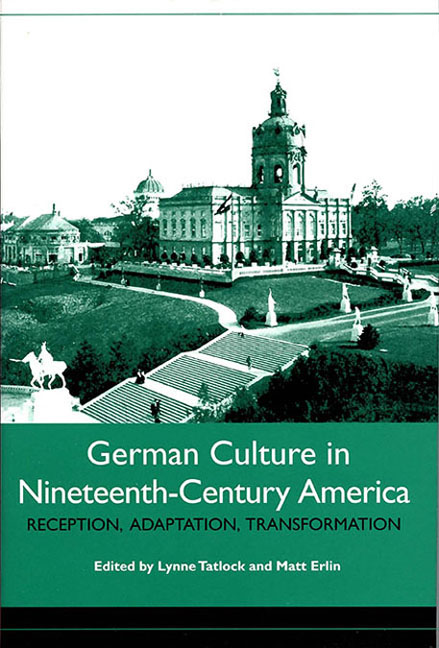Book contents
- Frontmatter
- Contents
- List of Illustrations
- Acknowledgments
- Introduction
- 1 Cultural Politics at the Turn of the Twentieth Century
- Cultural History: An American Refuge for a German Idea
- The Image of Culture — Or, What Münsterberg Saw in the Movies
- Tacitus Redivivus or Taking Stock: A. B. Faust's Assessment of the German Element in America
- The St. Louis World's Fair of 1904 as a Site of Cultural Transfer: German and German-American Participation
- 2 In Pursuit of Intellectual Culture
- 3 Translation American Style
- 4 Immigration and Naturalization Acts
- Contributors
- Index
The St. Louis World's Fair of 1904 as a Site of Cultural Transfer: German and German-American Participation
from 1 - Cultural Politics at the Turn of the Twentieth Century
Published online by Cambridge University Press: 13 April 2017
- Frontmatter
- Contents
- List of Illustrations
- Acknowledgments
- Introduction
- 1 Cultural Politics at the Turn of the Twentieth Century
- Cultural History: An American Refuge for a German Idea
- The Image of Culture — Or, What Münsterberg Saw in the Movies
- Tacitus Redivivus or Taking Stock: A. B. Faust's Assessment of the German Element in America
- The St. Louis World's Fair of 1904 as a Site of Cultural Transfer: German and German-American Participation
- 2 In Pursuit of Intellectual Culture
- 3 Translation American Style
- 4 Immigration and Naturalization Acts
- Contributors
- Index
Summary
Cultural transfer is a difficult term to define and to conceptualize. As Michael Werner has explained, it rarely takes place as an export from one nation to another or as one country's adjustment to the way of life of another. National cultures are not clear-cut or unified phenomena; they are dynamic systems, fields of conflict, contestation, and struggle. Personal and social values, forms of economic production, legal systems, religious convictions, political ideas or movements are, moreover, seldom agreed upon within one nation. They depend on regions, social class or status, the educational background of a nation's citizens, the wealth and strength of the country's elites, the weight of traditions, and visions for the future. The collective and individual identity segments of a national culture go through processes of constant construction and deconstruction, and these developments need to be analyzed in their synchronic and diachronic dimensions. Often, political or religious movements in one country have already formed a profile of their own but, in their struggle for influence, seek support from like-minded groups in another state or even several other countries. Thus, at any specific point in time, it is hardly possible to speak of “the” cultural transfer from Germany to the United States, or vice versa.
Bernd Kortländer has reflected on the processes of what he calls “Begrenzung” and “Entgrenzung” of national communities. “Begrenzung” (limitation) is associated with re-enforcing old or creating new borders, “Entgrenzung” (opening up) with reducing the effects of borders by establishing international cooperation. All sorts of “Entgrenzungen” and “Begrenzungen” occur during world's fairs, and they took place as well during the 1904 Louisiana Purchase Exposition, also called the Universal Exposition in St. Louis, or simply The St. Louis World's Fair. Both Werner's and Kortländer's observations are relevant when dealing with the 1904 World's Fair. In Kortländer's theory of cultural transfer the mediator (Vermittler) plays a central role. In the late nineteenth and the early twentieth centuries world's fairs were important international cultural mediators. They aimed to enable extraordinary educational experiences, were designed to be a sort of international university for a limited period of time, a market place of the grandest dimensions, a model city, an entertainment park of unseen proportions, in other words: something like a capitalist Gesamtkunstwerk. During the 1904 World's Fair, various kinds of cultural transfer and exchange took place on many levels.
- Type
- Chapter
- Information
- German Culture in Nineteenth-Century AmericaReception, Adaptation, Transformation, pp. 59 - 86Publisher: Boydell & BrewerPrint publication year: 2005



